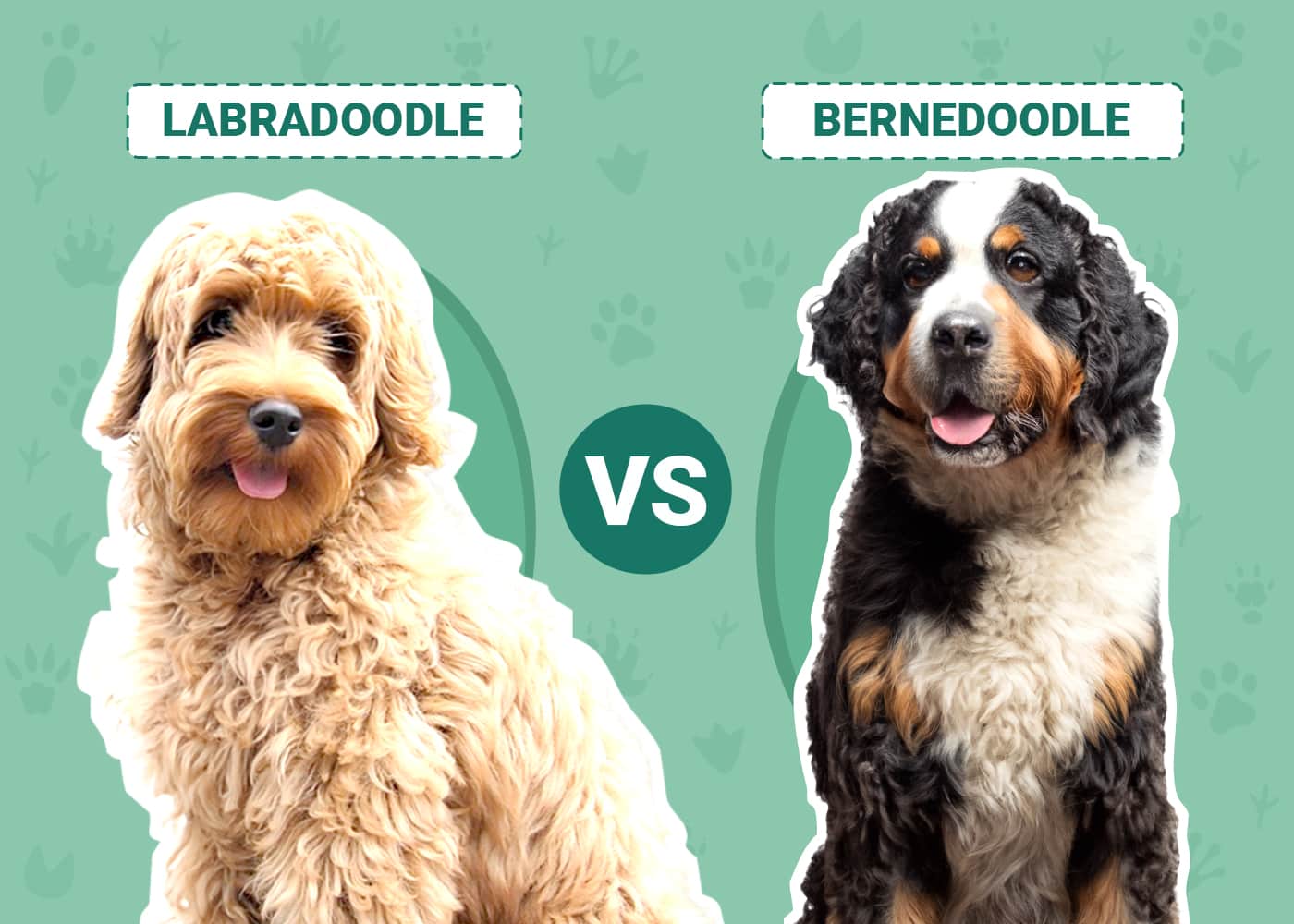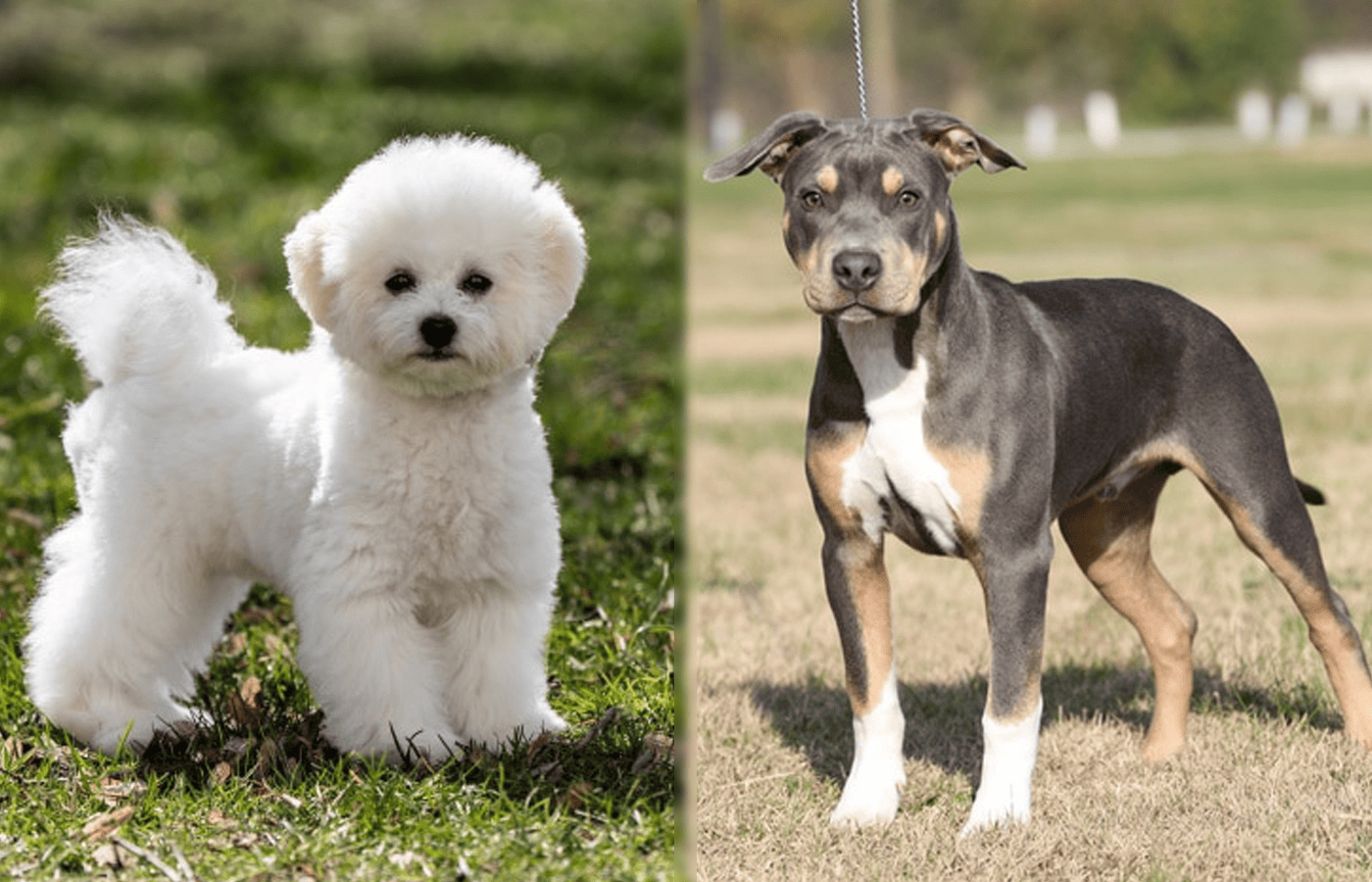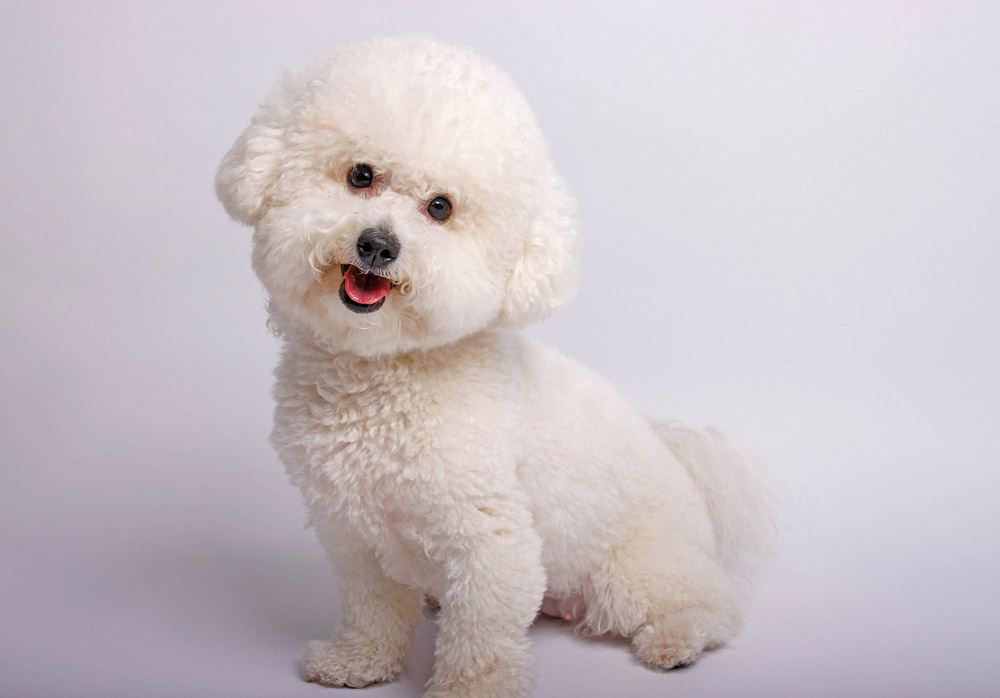Click to Skip Ahead
Dog breeds mixed with Poodles have become trendy over the years and have been made famous by celebrities that own them. These crossbreeds are usually called Doodles or Poos, and they’re composed of almost every breed imaginable.
Two such crossbreeds are the Labradoodle and the Bernedoodle. Labradoodles are Poodles mixed with Labradors, and Bernedoodles are crosses between Poodles and Bernese Mountain Dogs.
If you’ve been considering giving one of these pets a forever home, you might be having a hard time choosing between the two. In this guide, we’ll explain the differences between the two to help you decide.
Visual Differences
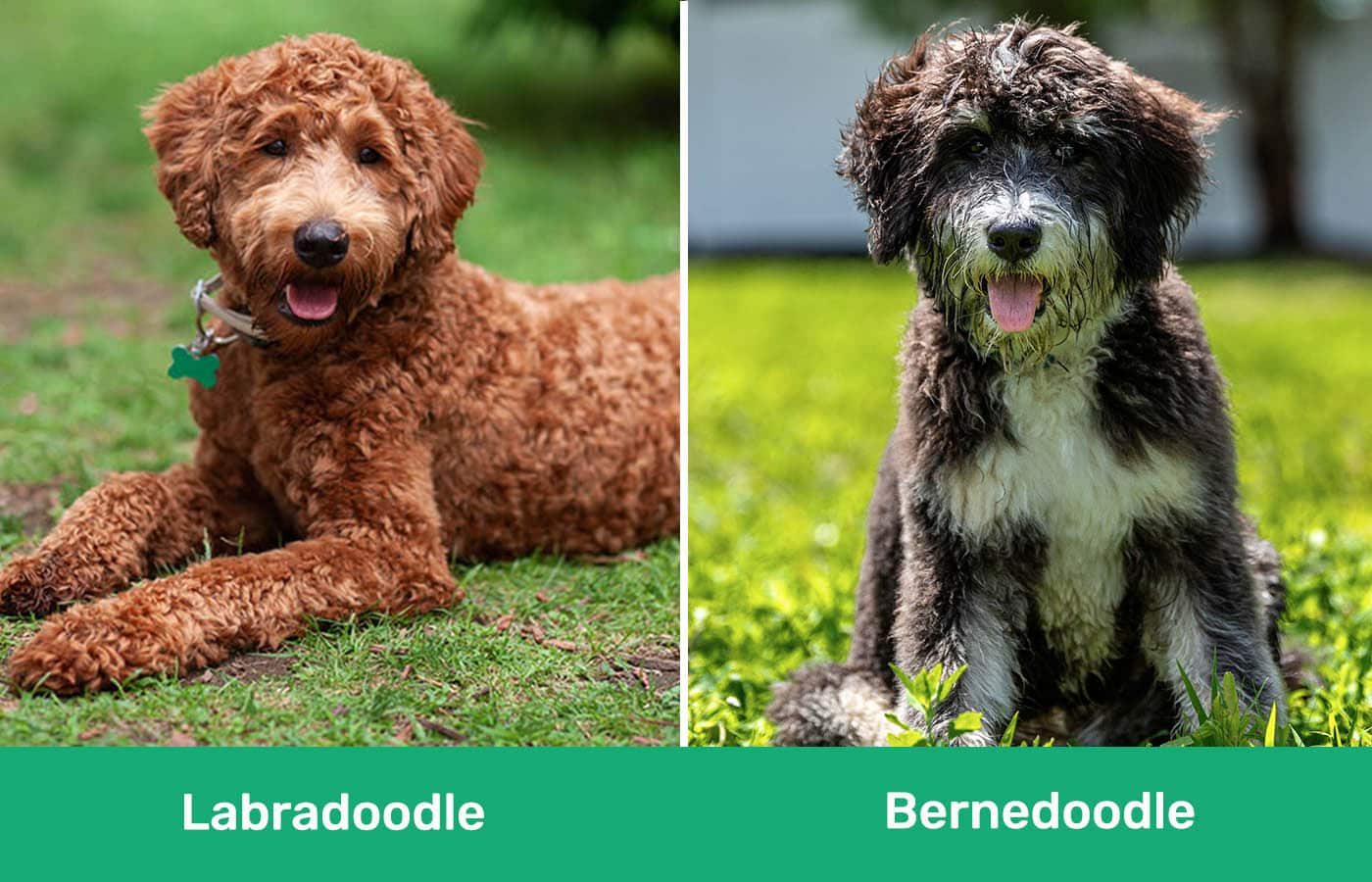
At a Glance
- Average height (adult): 14 to 24 inches
- Average weight (adult): 15 to 65 pounds
- Lifespan: 12 to 15 years
- Exercise: 1+ hours a day
- Grooming needs: Moderate to high
- Family-friendly: Yes
- Other pet-friendly: Yes
- Trainability: Intelligent, social, inquisitive
- Average height (adult): 12 to 29 inches
- Average weight (adult): 10 to 90 pounds
- Lifespan: 12 to 18 years
- Exercise: 1+ hours a day
- Grooming needs: Moderate to high
- Family-friendly: Yes
- Other pet-friendly: Yes
- Trainability: Intelligent, goofy, fun, loving
Labradoodle Overview
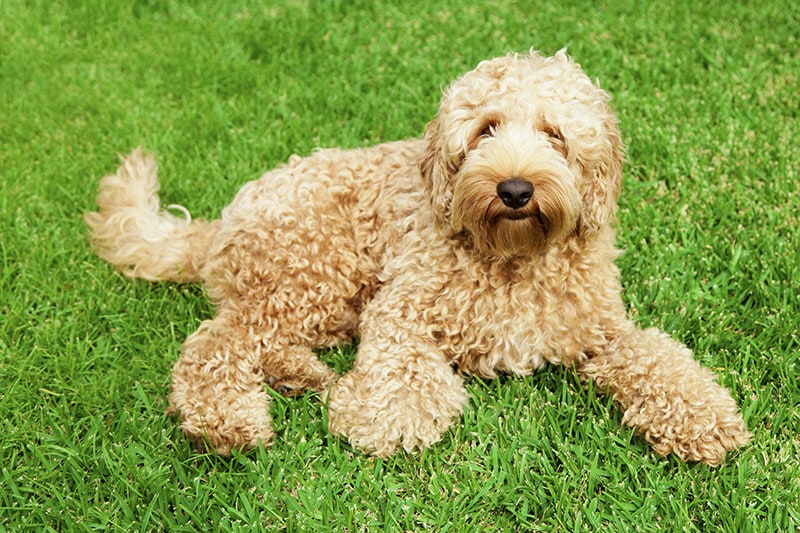
In our next section, we’ll discuss the dog’s personality, exercise needs, and health problems that you should be on the lookout for, as well as who the dog is best suited for as a pet.
Personality / Character
The Labradoodle is lively and quite friendly. They love being around humans and, in fact, crave human attention and interaction. Your Labradoodle will probably be sweet to everyone, including strangers, so they don’t make the best guard or watchdogs.
This inquisitive dog can get into trouble quickly if you don’t keep a close enough eye on them. They do great with children but will nip at them if they are too boisterous. Poodles are quite vocal pets, so you can expect your little Labradoodle to be a barker as well.
Exercise
The energy levels of your Labradoodle can vary, depending on the parents. They need around 1 hour of exercise a day, but be careful until you know how much energy your Labradoodle actually has. Labradoodles produced from standard Poodles are much larger than those mixed with the toy or miniature Poodles and have just as much energy. Two daily walks and plenty of play time with its owners should suit its exercise needs.

Health Issues
There are a few health issues that you need to watch out for with Labradoodles. These are conditions that they could inherit from their parents.
- Itchy skin
- Ear infections
- Digestive issues
- Allergies
- Hip dysplasia
- Certain cancers
- Cranial cruciate ligament tears
Suitable For:
The Labradoodle is a great pet for single individuals, couples, and families. They have no problems with other pets, and their love for people makes them accepting of everyone. Since they love people and can be high-energy dogs, they should go to an active family that is home for most of the day. Labradoodles that have standard Poodle heritage grow to be massive canines, and they may be too big families with infants. They’re great with children, but the dog’s size makes it a hazard to the young ones.
Bernedoodle Overview
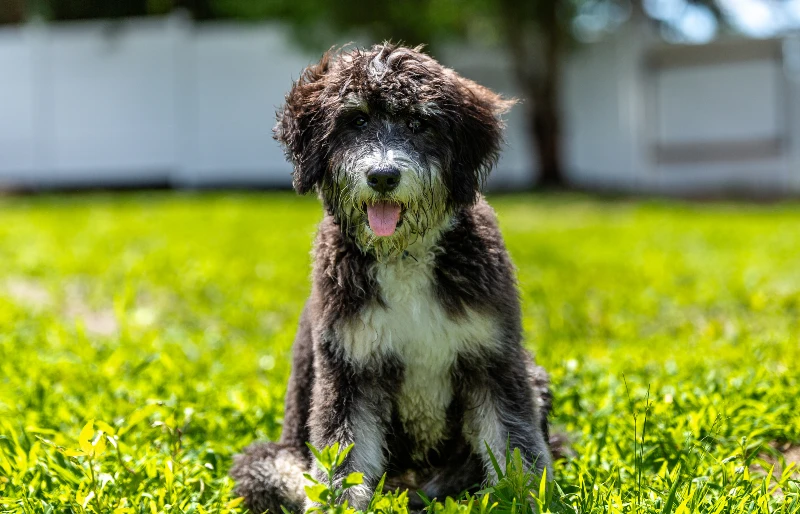
The Bernedoodle is a cross between a Poodle and a Bernese Mountain Dog, and they are just as loving and social as the Labradoodle.
Personality / Character
While the Bernedoodle is a loving, friendly dog, they tend to be a bit standoffish. This dog doesn’t warm up to people very quickly, and if they aren’t socialized as puppies, you risk having a skittish dog that is easily spooked by visitors.
It is a fun-loving dog with a silly streak, so be prepared to laugh and have fun with your Bernedoodle Puppy. They do great with small children but can be a bit clingy. This might be the wrong breed if you’re not looking for a dog that stays by you all day.
Exercise
The Bernedoodle needs at least an hour or more of exercise daily. As with the Labradoodle, this varies depending on the dog’s parents. Bernedoodles are energetic canines that need daily walks and play sessions with their owners. Because their coat types can vary, depending on whether they inherit their coat from the Poodle or Bernese Mountain Dog, they should exercise early in the morning or late in the evening in the summer. With thick coats, they can overheat quickly if pushed too hard in hot weather.
Health Issues
Just as you should with the Labradoodle, there are health issues to watch out for with the Bernedoodle.
- Skin issues
- Allergies
- Ear infections
- Obesity
- Excessive drooling
- Certain cancers
- Hip dysplasia
- Elbow dysplasia
- Epilepsy
- Heart disease
- Eye problems
One way to make sure that your pet doesn’t develop or suffer from the conditions above is to keep regular appointments with your vet for checkups so that these conditions can be caught and treated early.
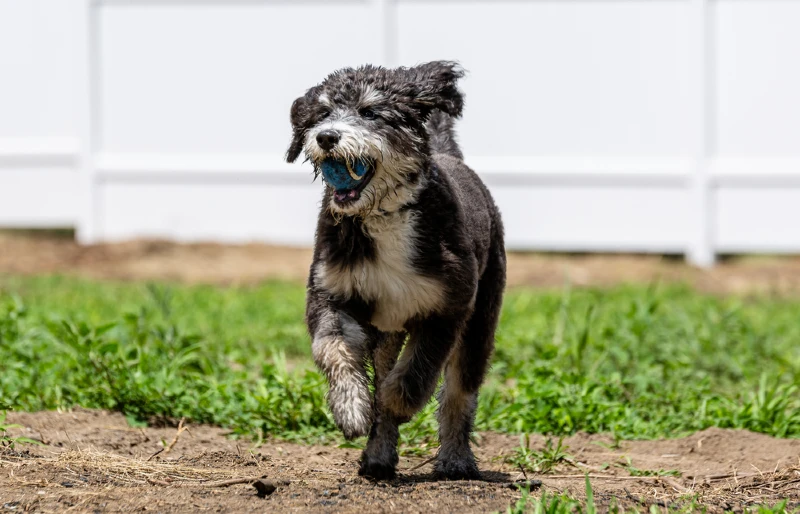
Suitable For:
Bernedoodles are great pets for families, especially families that have small children. They are active, so you need to be there for them to exercise every day. Like the Labradoodle, they’re happiest when spending time with their owners and don’t fare them when left alone. Active families that spend most of their time around the house are the ideal caretakers for Bernedoodles. They’re one of the best pets for families with infants because they’re calm and tolerant of tiny hands groping them.
Which Breed Is Right for You?
As you can see, the Bernedoodle and the Labradoodle are both excellent pets for families, and they have very few differences. The Bernedoodle is a bit more standoffish with strangers than the Labradoodle is, so you need to socialize it to be around strangers as a puppy.
Labradoodles and Bernedoodles are excellent family dogs, but if you have young children, the Bernedoodle is a bit more tolerant. When the dogs are bred from standard Poodles, they’re best for families with large yards. However, those mixed with the toy or miniature Poodles can happily live in apartments.
Related Reads:
- Sheepadoodle vs Labradoodle: The Key Differences (With Pictures)
- Labradoodle vs Goldendoodle: The Differences (With Pictures)
Featured Image Credit: (T) Justin Sienkiewicz, Shutterstock | (B) Cavan-Images, Shutterstock

